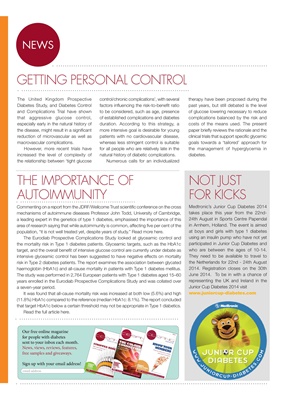
NEWS
NOT JUST
FOR KICKS
THE IMPORTANCE OF
AUTOIMMUNITY
Commenting on a report from the JDRF/Wellcome Trust scientific conference on the cross
mechanisms of autoimmune diseases Professor John Todd, University of Cambridge,
a leading expert in the genetics of type 1 diabetes, emphasised the importance of this
area of research saying that while autoimmunity is common, affecting five per cent of the
population, "it is not well treated yet, despite years of study." Read more here.
The Eurodiab Prospective Complications Study looked at glyceamic control and
the mortality risk in Type 1 diabetes patients. Glycemic targets, such as the HbA1c
target, and the overall benefit of intensive glucose control are currently under debate
as intensive glycemic control has been suggested to have negative effects on mortality
risk in Type 2 diabetes patients. The report examins the association between glycated
hemoglobin (HbA1c) and all-cause mortality in patients with Type 1 diabetes mellitus.
The study was performed in 2,764 European patients with Type 1 diabetes aged 15-60
years enrolled in the Eurodiab Prospective Complications Study and was collated over
a seven-year period.
It was found that all-cause mortality risk was increased at both low (5.6%) and high
(11.8%) HbA1c compared to the reference (median HbA1c: 8.1%). The report concluded
that target HbA1c below a certain threshold may not be appropriate in Type 1 diabetics.
Read the full article here.
Our free online magazine
for people with diabetes
sent to your inbox each month.
News, views, reviews, features,
free samples and giveaways.
Sign up with your email address!
email address
Medtronic's Junior Cup Diabetes 2014
takes place this year from the 22nd-
24th August in Sports Centre Papendal
in Arnhem, Holland. The event is aimed
at boys and girls with type 1 diabetes
using an insulin pump who have not yet
participated in Junior Cup Diabetes and
who are between the ages of 10-14.
They need to be available to travel to
the Netherlands for 22nd - 24th August
2014. Registration closes on the 30th
June 2014. To be in with a chance of
representing the UK and Ireland in the
Junior Cup Diabetes 2014 visit
www.juniorcup-diabetes.com
The United Kingdom Prospective
Diabetes Study, and Diabetes Control
and Complications Trial have shown
that aggressive glucose control,
especially early in the natural history of
the disease, might result in a significant
reduction of microvascular as well as
macrovascular complications.
However, more recent trials have
increased the level of complexity of
the relationship between 'tight glucose
GETTING PERSONAL CONTROL
control/chronic complications', with several
factors influencing the risk-to-benefit ratio
to be considered, such as age, presence
of established complications and diabetes
duration. According to this strategy, a
more intensive goal is desirable for young
patients with no cardiovascular disease,
whereas less stringent control is suitable
for all people who are relatively late in the
natural history of diabetic complications.
Numerous calls for an individualized
therapy have been proposed during the
past years, but still debated is the level
of glucose lowering necessary to reduce
complications balanced by the risk and
costs of the means used. The present
paper briefly reviews the rationale and the
clinical trials that support specific glycemic
goals towards a 'tailored' approach for
the management of hyperglycemia in
diabetes.